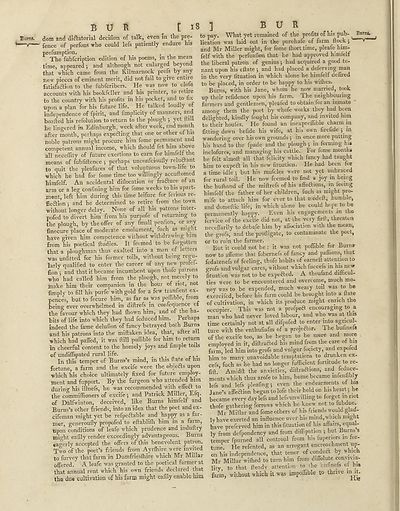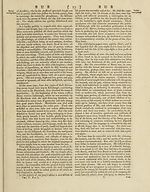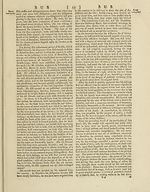Encyclopaedia Britannica, or, a Dictionary of arts, sciences, and miscellaneous literature : enlarged and improved. Illustrated with nearly six hundred engravings > Volume 5, BUR-CHI
(28) Page 18
Download files
Complete book:
Individual page:
Thumbnail gallery: Grid view | List view

BUR . t l!
Sums, dom and dictatorial decifion of talk, even in the pre-
fence of perfons who could lefs patiently endure his
prefumption.
The fubfcription edition of his poems, m the mean
time, appeared } and although not enlarged beyond
that which came from the Kilmarnock prefs by any
new pieces of eminent merit, did not fail to give entire
fatisfaction to the fubfcribers. He was now to clofe
accounts with his bookfeller and his printer, to retire
to the country with his profits in his pocket, and to fix
upon a plan for his future life. He talked loudly of
independence of fpirit, and fimplicity of manners, and
boafted his refolution to return to the plough 5 yet ftill
he lingered in Edinburgh, week after week, and month
after month, perhaps expefting that one or other of his
noble patrons might procure him fome permanent and
competent annual income, which thould fet him above
all neceflity of future exertions to earn for himfelf the
means of fubfiftence ; perhaps unconfcioufly reluftant
to quit the pleafures of that voluptuous town-life to
which he had for fome time too willingly accuftomed
himfelf. An accidental diflocation or fraaure of an
arm or a leg confining him for fome weeks to his apart¬
ment, left him during this time leifure for ferious re¬
flection ; and he determined to retire, from the.town
w'ithout longer delay. None of all his patrons.imer-
pofed to divert him from his purpofe of returning to
the plough, by the offer of any fmall penfion, or any
finecure place of moderate emolument,. fuch as might
have given him competence without withdrawing him
from his poetical itudies. It feemed to be forgotten
that a ploughman thus exalted into a man of letteis
was unfitted for his former toils, W'ithout being regu¬
larly qualified to enter the career of any new- profel-
flon ; and that it became incumbent upon thofe patrons
who had called him from the plough, not merely to
make him their companion in the hour of riot, not
Amply to fill his purfe with gold for a few tranfient ex-
pences, but to fecure him, as far as.was poffible, f10n\
being ever overwhelmed in diftrefs in confequence of
the favour which they had fhovn him, and of the ha¬
bits of life into which they had feduced him. Perhaps
indeed the fame delufion of fancy betrayed both Burns
and his patrons into the miflaken idea, that, after all
which had paffed, it was ftill poflible for him to return
in cheerful content to the homely joys and Ample toils
of undiflipated rural life. _ ^ .
In this temper of Burns’s mind, in this ftate of his
fortune, a farm and the excife were the objefts upon
which his choice ultimately fixed for future employ¬
ment and fupport. By the furgeon who attended him
during his illnefs, he was recommended with effeft to
the commiftioners of excife •, and Patrick Miller, Elq.
of Dalfwinton, deceived, like Burns himfelf and
Burns’s other friends, into an idea that the poet and ex-
cifeman might yet be refpeftable and happy as a far¬
mer, generoufly propofed to eftablifh him m a faim,
upon conditions of leafe udiich prudence and induftry
might eafily render exceedingly advantageous. Burns
eao-erlv accepted the offers of this benevolent pation.
Two of the poet’s friends from Ayrfhire were invited
to furvey that farm in Dumfriesfhire which Mr Millar
offered. A leafe wras granted to the poetical farmer at
that annual rent which his own friends declared that
the due cultivation of his farm might eafily enable him
] BUR
to pay. What yet remained of the profits of his pub- t Bnrns.
lication was laid out in the purchafe of farm flock j 'r*""
and Mr Miller might, for fome ftiort time, pleafe. him¬
felf wdth the perfuafion that he had approved himfelf
the liberal patron of genius 5 had acquired a good te¬
nant upon his eftate ; and had placed a deferring man
in the very iituation in which alone he himfelf defired
to be placed, in order to be happy to his withes.
Burns, with his Jane, whom he now married, took
up their reAdence upon his farm. Bhe neighbouring
farmers and gentlemen, pleafed to obtain for an inmate
among them the poet by whofe woiks they had been
delighted, kindly fought his company, and invited him
to their houfes. He found an inexpreffible charm in
fitting dowrn befide his wufe, at his own firefide j. in
W'andering over his own grounds j in once more putting
his hand to the fpade and the plough j in forming his
inclofures, and managing his cattle. lor fome months
he felt almoft all that felicity which fancy had taught
him to expedl in his new fituation. He had been for
a time idle *, but his mufcles were not yet unbraced
for rural toil. He now feemed to find a joy in beu.g
the hulband of the miftrefs of his afteftions, in feeing
himfelf the father of her children, fuch as might pro-
mife to attach him for ever to that model!, humble,
and domeftic life, in which alone he could hope to be
permanently happy. Even his engagements in the
fervice of the excite did not, at the very firft, threaten
neceffarily to debafe him by affociation with the mean,
the grofs, and the profligate, to contaminate the poet,
or to ruin the farmer.
But it could not be : it was not poflible for Burns-
now to affume that fobernefs of fancy and pafiions, that
fedatenefs of feeling, thofe habits of earneft attention to
grofs and vulgar cares, without which fuccefs in his new
fituation was not to be expefted. A thoufand difficul¬
ties were to be encountered and overcome, much mo¬
ney was to be expended, much weary toil , was to be
exercifed, before his farm could be brought into.a ftate
of cultivation, in which its produce might enrich the
occupier. This was not a profpedt encouraging to a
man who had never loved labour, and who was at.this
time certainly not at all difpofed to enter into agneu -
ture with the enthufiafm of a projector. -I he bufinefB
of the excife too, as he began to be more and more
employed in it, diftra£led his mind from the care ot his
farm, led him into grofs and vulgar.fociety, and expoied
him to many unavoidable temptations to drunken ex¬
cels, fuch as he had no longer fufficient fortitude to re¬
fill. Amidft the anxieties, diftra£lions, and ieduce-
ments which thus arofe to him, home became infenfibly
lefs and lefs pleafing •, even the endearments ot his
Jane’s affection began tolofe their hold on his heart j he
became every day lefs and lefs unwilling to forget in riot
thofe gathering borrows which he knew not to ffibdue.
Mr Millar and fome others of his friends would glad¬
ly have exerted an influence over his mind, which might
have preferved him in this fituation of his affairs, equal¬
ly from defpondency and from diffipation j but Burns s
temper fpurned all controul from his fupenors in for¬
tune. He refented, as an arrogant encroachment up¬
on his independence, that tenor of conduft by which
Mr Millar wifhed to turn him from diffolute convivia¬
lity to that fteady attention to the bufinefs of his,
farm, without which it was impoflible to thrive ir^it.
Sums, dom and dictatorial decifion of talk, even in the pre-
fence of perfons who could lefs patiently endure his
prefumption.
The fubfcription edition of his poems, m the mean
time, appeared } and although not enlarged beyond
that which came from the Kilmarnock prefs by any
new pieces of eminent merit, did not fail to give entire
fatisfaction to the fubfcribers. He was now to clofe
accounts with his bookfeller and his printer, to retire
to the country with his profits in his pocket, and to fix
upon a plan for his future life. He talked loudly of
independence of fpirit, and fimplicity of manners, and
boafted his refolution to return to the plough 5 yet ftill
he lingered in Edinburgh, week after week, and month
after month, perhaps expefting that one or other of his
noble patrons might procure him fome permanent and
competent annual income, which thould fet him above
all neceflity of future exertions to earn for himfelf the
means of fubfiftence ; perhaps unconfcioufly reluftant
to quit the pleafures of that voluptuous town-life to
which he had for fome time too willingly accuftomed
himfelf. An accidental diflocation or fraaure of an
arm or a leg confining him for fome weeks to his apart¬
ment, left him during this time leifure for ferious re¬
flection ; and he determined to retire, from the.town
w'ithout longer delay. None of all his patrons.imer-
pofed to divert him from his purpofe of returning to
the plough, by the offer of any fmall penfion, or any
finecure place of moderate emolument,. fuch as might
have given him competence without withdrawing him
from his poetical itudies. It feemed to be forgotten
that a ploughman thus exalted into a man of letteis
was unfitted for his former toils, W'ithout being regu¬
larly qualified to enter the career of any new- profel-
flon ; and that it became incumbent upon thofe patrons
who had called him from the plough, not merely to
make him their companion in the hour of riot, not
Amply to fill his purfe with gold for a few tranfient ex-
pences, but to fecure him, as far as.was poffible, f10n\
being ever overwhelmed in diftrefs in confequence of
the favour which they had fhovn him, and of the ha¬
bits of life into which they had feduced him. Perhaps
indeed the fame delufion of fancy betrayed both Burns
and his patrons into the miflaken idea, that, after all
which had paffed, it was ftill poflible for him to return
in cheerful content to the homely joys and Ample toils
of undiflipated rural life. _ ^ .
In this temper of Burns’s mind, in this ftate of his
fortune, a farm and the excife were the objefts upon
which his choice ultimately fixed for future employ¬
ment and fupport. By the furgeon who attended him
during his illnefs, he was recommended with effeft to
the commiftioners of excife •, and Patrick Miller, Elq.
of Dalfwinton, deceived, like Burns himfelf and
Burns’s other friends, into an idea that the poet and ex-
cifeman might yet be refpeftable and happy as a far¬
mer, generoufly propofed to eftablifh him m a faim,
upon conditions of leafe udiich prudence and induftry
might eafily render exceedingly advantageous. Burns
eao-erlv accepted the offers of this benevolent pation.
Two of the poet’s friends from Ayrfhire were invited
to furvey that farm in Dumfriesfhire which Mr Millar
offered. A leafe wras granted to the poetical farmer at
that annual rent which his own friends declared that
the due cultivation of his farm might eafily enable him
] BUR
to pay. What yet remained of the profits of his pub- t Bnrns.
lication was laid out in the purchafe of farm flock j 'r*""
and Mr Miller might, for fome ftiort time, pleafe. him¬
felf wdth the perfuafion that he had approved himfelf
the liberal patron of genius 5 had acquired a good te¬
nant upon his eftate ; and had placed a deferring man
in the very iituation in which alone he himfelf defired
to be placed, in order to be happy to his withes.
Burns, with his Jane, whom he now married, took
up their reAdence upon his farm. Bhe neighbouring
farmers and gentlemen, pleafed to obtain for an inmate
among them the poet by whofe woiks they had been
delighted, kindly fought his company, and invited him
to their houfes. He found an inexpreffible charm in
fitting dowrn befide his wufe, at his own firefide j. in
W'andering over his own grounds j in once more putting
his hand to the fpade and the plough j in forming his
inclofures, and managing his cattle. lor fome months
he felt almoft all that felicity which fancy had taught
him to expedl in his new fituation. He had been for
a time idle *, but his mufcles were not yet unbraced
for rural toil. He now feemed to find a joy in beu.g
the hulband of the miftrefs of his afteftions, in feeing
himfelf the father of her children, fuch as might pro-
mife to attach him for ever to that model!, humble,
and domeftic life, in which alone he could hope to be
permanently happy. Even his engagements in the
fervice of the excite did not, at the very firft, threaten
neceffarily to debafe him by affociation with the mean,
the grofs, and the profligate, to contaminate the poet,
or to ruin the farmer.
But it could not be : it was not poflible for Burns-
now to affume that fobernefs of fancy and pafiions, that
fedatenefs of feeling, thofe habits of earneft attention to
grofs and vulgar cares, without which fuccefs in his new
fituation was not to be expefted. A thoufand difficul¬
ties were to be encountered and overcome, much mo¬
ney was to be expended, much weary toil , was to be
exercifed, before his farm could be brought into.a ftate
of cultivation, in which its produce might enrich the
occupier. This was not a profpedt encouraging to a
man who had never loved labour, and who was at.this
time certainly not at all difpofed to enter into agneu -
ture with the enthufiafm of a projector. -I he bufinefB
of the excife too, as he began to be more and more
employed in it, diftra£led his mind from the care ot his
farm, led him into grofs and vulgar.fociety, and expoied
him to many unavoidable temptations to drunken ex¬
cels, fuch as he had no longer fufficient fortitude to re¬
fill. Amidft the anxieties, diftra£lions, and ieduce-
ments which thus arofe to him, home became infenfibly
lefs and lefs pleafing •, even the endearments ot his
Jane’s affection began tolofe their hold on his heart j he
became every day lefs and lefs unwilling to forget in riot
thofe gathering borrows which he knew not to ffibdue.
Mr Millar and fome others of his friends would glad¬
ly have exerted an influence over his mind, which might
have preferved him in this fituation of his affairs, equal¬
ly from defpondency and from diffipation j but Burns s
temper fpurned all controul from his fupenors in for¬
tune. He refented, as an arrogant encroachment up¬
on his independence, that tenor of conduft by which
Mr Millar wifhed to turn him from diffolute convivia¬
lity to that fteady attention to the bufinefs of his,
farm, without which it was impoflible to thrive ir^it.
Set display mode to:
![]() Universal Viewer |
Universal Viewer | ![]() Mirador |
Large image | Transcription
Mirador |
Large image | Transcription
Images and transcriptions on this page, including medium image downloads, may be used under the Creative Commons Attribution 4.0 International Licence unless otherwise stated. ![]()
| Permanent URL | https://digital.nls.uk/192984633 |
|---|
| Attribution and copyright: |
|
|---|
| Description | Ten editions of 'Encyclopaedia Britannica', issued from 1768-1903, in 231 volumes. Originally issued in 100 weekly parts (3 volumes) between 1768 and 1771 by publishers: Colin Macfarquhar and Andrew Bell (Edinburgh); editor: William Smellie: engraver: Andrew Bell. Expanded editions in the 19th century featured more volumes and contributions from leading experts in their fields. Managed and published in Edinburgh up to the 9th edition (25 volumes, from 1875-1889); the 10th edition (1902-1903) re-issued the 9th edition, with 11 supplementary volumes. |
|---|---|
| Additional NLS resources: |
|

